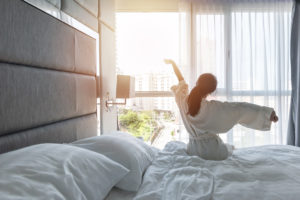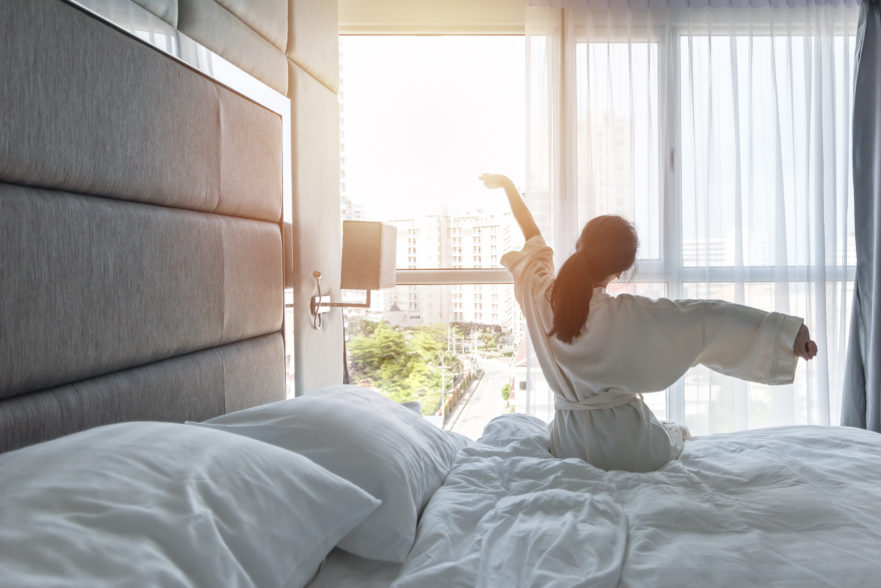 When it comes to your health, getting the right amount and quality of sleep is essential.
When it comes to your health, getting the right amount and quality of sleep is essential.
A recent study found that people who are sleep deprived, or are not getting enough good quality sleep on a regular basis, are more likely to become sick after being exposed to a virus and take longer to recover once they get sick.
Another study showed that people who routinely sleep less than six hours a night are less likely to trigger an antibody response after receiving a vaccination. These sleep deprived individuals were 11.5 times more likely to be unprotected from a vaccine compared to individuals who get seven hours a night or more.
While getting the right amount of sleep can’t always prevent you from becoming sick, routinely getting enough sleep is a great way to insure that your immune system is ready to defend against whatever comes your way. Here are a few suggestions/hacks to help boost your sleep quality.
1. Set a Regular Sleep/Wake Cycle
Find a sleep schedule that works for you and make it a habit to sleep and wake up at the same time everyday.
When the sun rises, it signals your brain to release cortisol which makes you feel awake and energetic. When the sun sets, it signals your brain to release melatonin, a hormone that promotes sleep and helps you stay asleep throughout the night. This is how your master clock/circadian rhythm aligns your sleep and wakefulness cycles with day and night. And it works best when your circadian rhythm is consistent.
2. Go Outside in the Morning
Sunlight is a powerful signal to your body. When you go outside in the morning, light rays from the sun enter through your eyes and connect to your biological clock which influences your chemistry and behavior.
As little as 30 minutes of bright light exposure in the early morning can help regulate your circadian rhythm, thereby improving your sleep-wake cycles. Just be sure to keep your sunglasses off so all that bright light can reach your eyes.
3. Reduce Your Exposure to Artificial Light in the Evening
Just as sunlight in the morning signals our bodies that it’s daytime, our bodies need to know that it is night time once the sun goes down.
Our brains start releasing melatonin as darkness begins which makes us feel sleepy and causes our body temperature to drop. But melatonin production can be inhibited if you are exposed to blue light in the evening.
Blue light from laptops, cell phones, and other light-emitting devices can throw off your internal clock and confuse your brain into thinking it’s daytime, so turn off these devices two or three hours before bedtime.
Or, try wearing amber tinted glasses in the evening. These blue light blocking glasses are one of the best biohacks for supporting evening melatonin production. And research shows that wearing them two hours before bedtime can really improve your sleep quality.
4. Improve Your Sleep Environment (Sleep Cave)
Make your bedroom a sleep haven to promote the best quality of sleep. This means blocking out light so that your bedroom is as dark as a cave (I use blackout shades); keeping the room cool, ideally below 68 degrees Fahrenheit; and, reducing all noise by turning off anything that makes a sound. I like the Air Doctor air filter which is similar to a white noise machine but you get the added benefit of clean air while you sleep!
5. Use a Wearable Device to Track Your Sleep
One of the best ways to know if you are getting good quality sleep is to use a wearable device to measure your sleep. I am a big fan of the Oura ring. It tracks your vital signs such as heart rate, respiratory rate, and temperature, which can warn you in advance about the potential onset of a flu or fever.
And just like Fitbit and other popular health tracking devices, the Oura ring displays step count, calorie burn and sleep quality, including how long you spent in REM and the deep and light stages of sleep.
But heart rate variability (HRV), or the time between heartbeats, and resting heart rate (RHR) are probably the most valuable metrics because they let you know how well your body is recovering from exercise, digesting food, and other daily stressors which could lead to better sleep quality.
If you’ve become stuck in a pattern of waiting for things to get ” back to normal” to continue your workouts, contact us today to discuss how we can help you get back on track.

